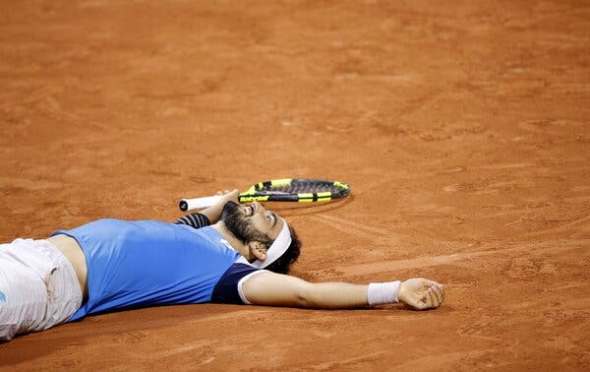With no last-set tiebreaker, French Open match lasts more than six hours
By Ben Rothenberg
ROLAND GARROS – At the only Grand Slam tournament where marathon matches are still allowed to drift endlessly into the unknown, Lorenzo Giustino and Corentin Moutet took more than six hours to finish Monday (28) what had started a day earlier at the French Open.
Giustino, an Italian qualifier ranked 157th, prevailed, 0-6, 7-6 (7), 7-6 (3), 2-6, 18-16, over the 71st-ranked Moutet of France. The match started Sunday (27) but was suspended after nearly two hours because of rain, with Giustino leading by 4-3 in the third set. It resumed on Monday and ultimately lasted 6 hours 5 minutes, split between the two days.
After rule changes instituted at the Australian Open and Wimbledon last year, each of the four Grand Slam tournaments now ends deadlocked final sets in its own fashion. The US Open holds a first-to-seven tiebreaker at 6-6. The Australian Open has a first-to-10 tiebreaker at 6-6. And Wimbledon waits until 12-12 to play a first-to-seven tiebreaker.
At the French Open, however, no such finish line has been drawn onto the powdery red clay surface: Final sets of main-draw singles matches continue beyond 6-6 until a player has a two-game lead.
Giustino, who played his first Grand Slam main draw only earlier this year in Melbourne, did not realize the unique rule at Roland Garros until he was watching a first-round match Sunday between Jurij Rodionov and Jérémy Chardy, which Rodionov won, 10-8, in the fifth set.
“I said, ‘No, there is no tiebreaker in the fifth?’” Giustino recalled asking his coach. “I said, ‘No, way, man.’ And so my coach said, ‘You know that you will go like 12-10, something like that, in the fifth.’ I always do like this in my matches — and look what happened.”
Giustino indeed went long in qualifying even though tiebreakers were used. He won in a final-set tiebreaker in his first-round qualifying match, and 7-5 in the third set of his second round qualifying match.
Monday’s match, perhaps surprisingly, did not break any records, coming in as the fourth-longest match in Grand Slam history, and the second-longest at the French Open by elapsed time. It did equal the mark for most games in the fifth set of a French Open match, tying the 34 games in which Paul-Henri Mathieu beat John Isner in 2012, and in which Facundo Bagnis defeated Julien Benneteau in 2014.
Both those matches also featured French players, each packing thousands into the stands. But in this pandemic-era Grand Slam event, where the French government has capped spectators at 1,000 per day, Moutet was not able to even have his relatives who live near Roland Garros in attendance.
“I am used to sharing it with my loved ones every year; it wasn’t possible this year,” Moutet said. “It’s a shame, but hey, it’s for the good of all, and it’s necessary. There are things that are more important than our well-being as tennis players.”
As word of the interminable fifth set spread around the grounds, however, a decent contingent of people flocked to Court 14 to watch the conclusion.
“It was really cool they came to see me, to encourage me, despite the small audience,” said Moutet, who spent some of his free time during the coronavirus hiatus writing and performing moody piano-driven rap music.
“Frankly, there was everything for me to win this game, finally. Everyone did everything to make me win this game. I failed to win,” Moutet said. “It sure hurts.”
Giustino, who is part of a deep crop of rising talent in Italian men’s tennis, said he thought he spotted some of his compatriots urging him on from the stands of Court 14, but he couldn’t be confident who was behind every mask.
“I saw people who were trying to give me energy, and I thought, OK, this guy is not French for sure,” he said.
After the longest match of his career, Giustino joked that he was ready for more.
“Perfect,” he said. “Tomorrow I’ll go run a bit because I think I’m too fresh.”
The match had ripple effects beyond Giustino, who will be a considerable underdog in the next round against the 12th-seeded Diego Schwartzman. It delayed all remaining matches scheduled on Court 14, including the one immediately after, which featured a three-time Grand Slam champion.
Angelique Kerber, who needs only a French Open title to win each of the four Grand Slam events during her career, said she “was warming up more than 10 times” as she anticipated many possible finishes to the match that never came.
“I couldn’t find my rhythm, especially at the beginning of the first set,” Kerber said after losing, 6-3, 6-3, to Kaja Juvan.
The final match scheduled for Court 14, between Arantxa Rus and Clara Burel, was ultimately relocated to Court 7, but still became the first match in French Open history to finish after midnight, after the Grand Slam tournament in the City of Lights finally installed some for the first time this year.
Burel won, 6-7 (7), 7-6 (2), 6-3, at 12:10 a.m. on Tuesday (29). That, of course, was a French Open record.
-New York Times


